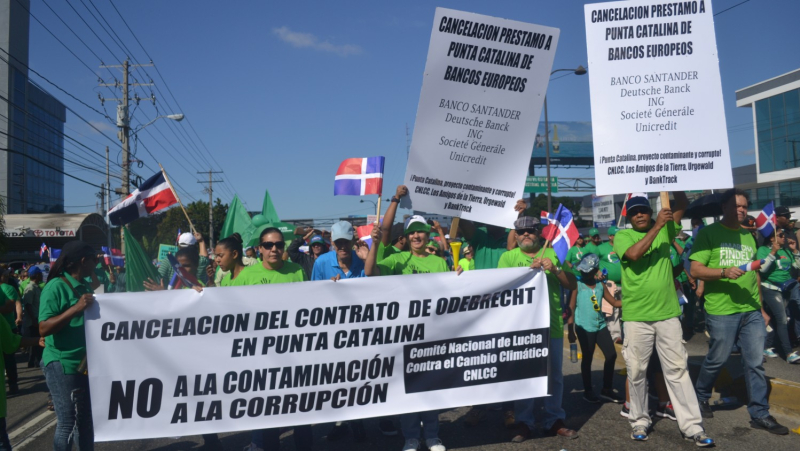Campaigners to call for Deutsche Bank exit from Dominican coal plant at annual meeting
- Massive bribery allegations against plant construction company Odebrecht
climate@banktrack.org
Regine Richter, urgewald: +49 170 29 30 725, regine@urgewald.org

climate@banktrack.org
Regine Richter, urgewald: +49 170 29 30 725, regine@urgewald.org
At Deutsche Bank’s annual general meeting on May 18, representatives of German, Dominican and international civil society will urge the bank to stop its financing for the Punta Catalina coal power plant, amid allegations of corruption surrounding the project.
In the Caribbean state of Dominican Republic, Deutsche Bank is heading a financial consortium featuring four other top European banks which have already disbursed more than half of an agreed $632.5 million loan, signed in 2015, for two new coal-fired power plants in the city of Punta Catalina.
The Brazilian company Odebrecht, which received the construction contracts, is accused of bribery in the bidding process for the $2 billion project. At the annual general meeting, representatives of the National Committee to Combat Climate Change (CNLCC, Dominican Republic), urgewald (Germany) and BankTrack (international) will urge Deutsche Bank to leave the project.
On 21 December 2016, Odebrecht admitted in a New York court that it made bribery payments of $92 million to Dominican officials and intermediaries to secure contracts for a range of infrastructure projects between 2001 and 2014. Allegations that the Punta Catalina project is affected by the confirmed Odebrecht bribery are currently under investigation. The cases in the Dominican Republic are part of a bigger bribery scandal involving Odebrecht in 12 Latin American countries.
Deutsche Bank has committed to take action against corruption, both as a signatory to the Global Compact, a pact for responsible corporate governance initiated by the UN, and in its own compliance program.
Regine Richter, from the environmental organisation urgewald, said: "If Deutsche Bank is serious about its fight against corruption, it must stop all financing for Punta Catalina. Otherwise, a new reputational and environmental disaster is looming."
Enrique de León, from the climate protection organisation CNLCC, will describe the potentially devastating environmental and social impacts of the coal power plants at Deutsche Bank’s AGM.
Enrique de León said: "My country is blessed with an abundance of renewable energy sources. Instead of making a positive impact here, Deutsche Bank wants to make my country a fossil hostage for decades by funding these new coal-fired power plants. With the corruption clouds still hanging over the project, we believe that Deutsche Bank now has the perfect opportunity to make a clean break from the deeply dirty Punta Catalina project."
It is estimated that the Punta Catalina power plants will emit more than 6 million tonnes of CO2 per year, thus increasing the Dominican Republic’s CO2 emissions by 20 percent.
As per its new coal policy introduced in January this year , Deutsche Bank has committed to stop direct financing for all new coal-fired power plants. This restriction does not however apply to Punta Catalina, which Deutsche Bank agreed to finance in 2015. While Deutsche Bank’s new policy on coal has introduced new restrictions it does not end the bank’s financing – via corporate loans – of companies which build coal power plants.
Greig Aitken, coal campaigner at BankTrack, said: "In order to support the Paris climate goals and stop lagging behind other banks in climate protection, Deutsche Bank has got to get a lot more ambitious. In the case of Punta Catalina, though, it’s not about ambition. It’s about abiding by the law and not condoning corruption, and Deutsche Bank should quickly move to end its involvement in this embarrassing investment.”
Notes for editors:
1. ING, Santander, Société Générale and UniCredit make up the Punta Catalina finance consortium with Deutsche Bank. For background information about the Punta Catalina coal plant project, see the BankTrack dodgy deal profile.
2. See commentary on Deutsche Bank’s policy on coal finance introduced in January 2017.

